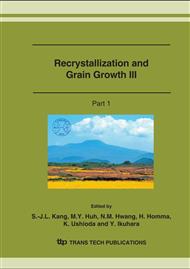p.1249
p.1255
p.1261
p.1265
p.1273
p.1279
p.1283
p.1295
p.1299
Grain Refinement of High-Purity FCC Metals Using Equal-Channel Angular Pressing
Abstract:
Equal-channel angular pressing (ECAP) is a valuable technique for refining grain sizes to the submicrometer or the nanometer range. This study explores the reason for the difference in the grain refining behavior between pure Al and pure Cu. First, very high purity levels were adopted in order to minimize any effects of impurities: 99.999% for Al and 99.99999% for Cu. Second, high purity (99.999%) Au was also used in order to examine the effect of stacking fault energy. All three pure metals were subjected to ECAP and microstructural observations and hardness measurements were undertaken with respect to the number of ECAP passes. It is concluded that the stacking fault energy plays an important role and accounts for the difference in the grain refining behavior in the ECAP process.
Info:
Periodical:
Pages:
1273-1278
Citation:
Online since:
October 2007
Price:
Сopyright:
© 2007 Trans Tech Publications Ltd. All Rights Reserved
Share:
Citation:


